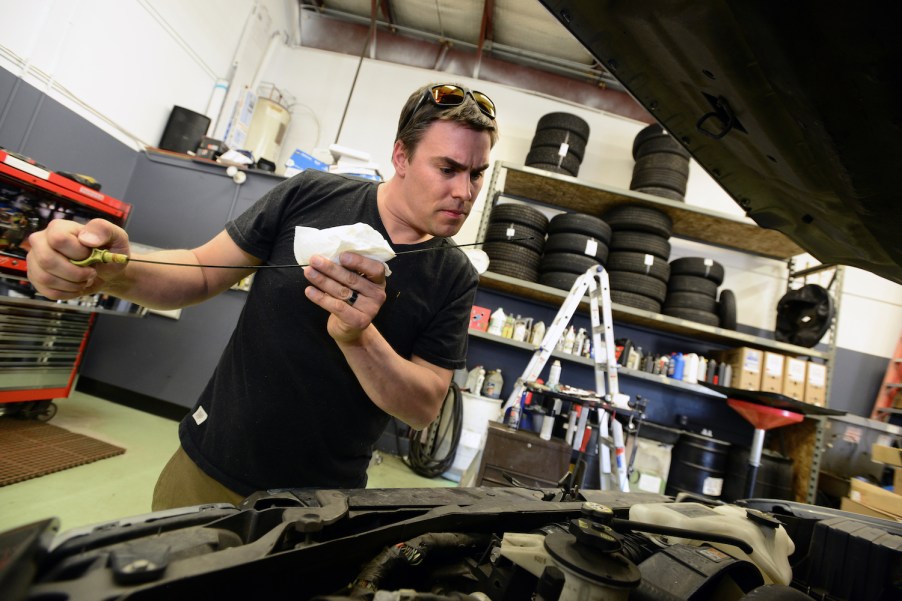
Walk Away! Here are 5 Deal Breakers When Buying a Used Car
Times are tough right now when it comes to buying a used car. There has been an inventory shortage all year, which has caused used car prices to skyrocket at dealerships nationwide. This astronomical uptick has led buyers to turn to their local classifieds and buy cars from private parties as opposed to the traditional dealers to get a better deal.
However, those “good deals” could stem from a variety of issues caused by improper care of the car. As such, here are five obvious signs where you want to consider walking away from the used car that you’re interested in.
1. A salvaged title or a “total loss” can mean trouble

While a salvaged title doesn’t necessarily mean that the car is not worth buying, it can mean that there are serious issues lurking beneath its sheet metal. According to Credit Karma, “a salvaged title is usually issued when a car has been damaged in a wreck or other incident and the cost for repairs is more than the car’s worth.”
The term “other incident” refers to the fact that the car could have been damaged in a flood, an electrical fire, or possibly even stolen and mostly stripped. In all of these cases, it may not be worth the money saved up front if the car ends up having issues down the road.
On a positive note, some salvaged titled cars may not have incurred that much damage at all. In some cases, the car may have received the branded title due to the car’s low market value (i.e. a ’95 Honda Civic that had its engine stolen). In those cases, it can actually be worth buying a car with a salvage title because the damage wasn’t as extensive and the price of the car will be lower.
2. There is a lot of rust everywhere

Considering you’re driving a big hunk of metal on wheels, rust is a really big issue, especially if the car that you’re buying resides in a snow state. However, Cars Direct recommends checking the car out completely for rust no matter which state you’re buying it in.
The car’s underbody is prone to having rust, so be sure to check underneath the car for any signs of rust or patched-up rust spots. The fender wells and other lower body panels can get rusty as well, so give those parts a thorough inspection.
Small rust spots can be patched up or repaired, so don’t let those completely scare you away. If you need a second opinion, then you can always ask to take the car to an auto body shop to get an estimate. Otherwise, if you see a lot of rust then it’s probably better to stay away from the car unless you don’t mind having to do a lot of bodywork to it.
3. The oil is dark and/or sludgy

Believe it or not, not many car shoppers check the car’s oil before purchasing it. And while we can’t blame them, we also can’t stress enough the importance of doing so. Remember to check the car’s oil and notice if it’s dark or really thick.
If so, then it’s possible that the seller didn’t get the car’s oil changed routinely, which could lead to more serious issues. Do yourself a favor and pull the dipstick as checking the car’s oil can prevent you from making an expensive mistake.
4. The car feels sluggish

If you’re shopping in the private party used car market, then you might end up checking out a few high-mileage cars. In some cases, these well-used cars can end up feeling sluggish when accelerating and some may even sputter or stall out. If any car that you check out does that, then it’s highly likely that it’s in bad need of repair or was subject to a lot of negligence.
Either way, you should probably walk away from the deal. Spending more money on a car with fewer miles could actually save you more money in the long run.
5. The engine knocks or ticks upon acceleration

When test driving a used car, it’s important to do so with the radio off so you can listen for any weird noises. If you do end up hearing a knocking or ticking noise, then it could be something as innocuous as valves that need an adjustment to something worse, like a rod knock. In that case, the engine would need a complete overhaul and it would be better to walk away from it altogether.
Buying a used car can be tricky, but a pre-purchase inspection can help
Ultimately, a car’s good looks can be deceiving, so it’s important to have a pre-purchase inspection done on any car that you’re set on buying. And while the five aforementioned scenarios could necessitate you walking away from the deal completely, there are times when a car can be salvageable and you could end up getting a really great deal, even in the current market.



